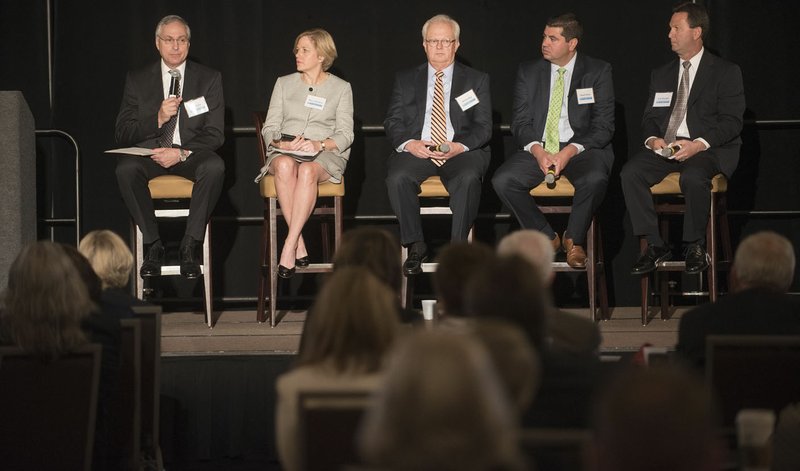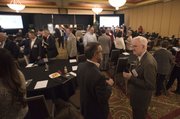ROGERS -- Addressing the shortage of medical workers is a top priority in strengthening Northwest Arkansas' health care economy.
About 150 leaders from the health care industry determined an expanded health-focused regional strategy and an organization focused on developing and implementing the plan are good first steps.
Key points
The 150 attendees of the Northwest Arkansas Council’s Health Care Summit Wednesday broke
into four focus groups that evaluated three areas. Here are the key takeaways in each topic.
Workforce development
• Additional organized collaboration
• Education — talk to children about health care opportunities when they are younger to build a pipeline of talent
• Attraction and retention — don’t have health systems cannibalize each other; attract and retain own employees
Economic development
• Get more support for the University of Arkansas for Medical Sciences Northwest
• More involvement in the political process and decisions
• Benchmark Northwest Arkansas against comparable regions
Community health
• Healthy community vs. health care focused — such prevention and exercise opportunities rather wait-and-treat
• Personal accountability
• Statewide electronic platform and information sharing
• Streamlining resources — reduce duplicity and gaps
Source: Staff report
"We have great partners doing great things; a lot of individual passion and organizational commitment to these things," said Mike Malone, president and CEO of the Northwest Arkansas Council. "Now we need to turn these ideas into action and go to work." The council organized Wednesday's Health Care Summit.
The council is a private, nonprofit organization collaborating with business and civic leaders to work on regional economic development, community vitality, educational excellence and infrastructure. Malone said he had a flashback to January 2011 when the council unveiled its Greater Northwest Arkansas Development Strategy that identified the region's health care offerings as an economic development opportunity.
A board member approached Malone after the 2011 meeting and said, "Good job. You are at the end of the beginning," he said. "That really hit home to me; we had a lot of work to do."
Ideas from the summit will be compiled into a report over the next few weeks and given to the council's board, Mark Simmons, chairman of Simmons Foods and the council's co-chairman, said after the event.
"This group is not for us to own, but maybe for us to facilitate," he said.
The summit featured breakout sessions and a panel discussion with hospital and medical school leaders who identified challenges such as filling and creating health care jobs.
Bill Bradley, president and CEO of Washington Regional Medical System, said the region's growing population can support new specialties and attract new physicians.
"We have 200 jobs we need to fill by the end of the year," he said.
The U.S. Census Bureau reports the region grew by more than 10 percent between 2010 and 2015, reaching 513,559 people last year. The area is adding about 31 people each day.
"We talk about the goal of being a destination for health care. I think it is happening, maybe just not as fast as some people would like," Bradley said, adding the Fayetteville hospital draws patients from 14 counties in Arkansas, Missouri and Oklahoma.
Another problem hospitals may find when hiring specialists is many now like to earn additional degrees, which can make them too expensive to hire, said Marcy Doderer, president and CEO of Arkansas Children's Hospital. Reimbursement rates don't change because of a higher education level, she said.
Children's Hospital is building a Springdale facility set to open in January 2018.
"It's a $160 million investment over the next couple of years and will bring new workforce opportunities," Doderer said.
Eric Pianalto, president of Mercy Hospital Northwest Arkansas, said the physician shortage isn't unique in Northwest Arkansas and some specialties are limited nationally. He added filling open positions expands far beyond direct medical care.
"In a labor market like this, every position you have is competitive, from housekeeping to cooking staff," he said. "It's important to recruit and retain folks."
Northwest Arkansas unemployment rate was 3.3 percent in February.
Health care jobs make up 6.5 percent of the region's workforce, trailing the national average of 8.7 percent, according to the U.S. Bureau of Labor Statistics. Despite lagging national percentages, health care has been the area's fastest growing industry since 2011; employers created more than 11,000 net new jobs since 2001.
Daniel Rahn, chancellor of the University of Arkansas for Medical Sciences, said new programs, such as a recently launched internal medicine residency program, at the school will help fill some openings.
"The easiest way to address the future physician workforce demand is to grow your own," he said.
Arkansas lags near the bottom in many national health rankings but is near the top when it comes to keeping doctors trained in state. The Association of American Medical Colleges reports 59 percent of medical undergraduates from the state's medical school stay in state. The national average is 39 percent.
Joe Thompson, director of the Arkansas Center for Health Improvement and the state's former surgeon general, moderated the panel discussion and said after the event it was clear community leaders want to work together to address the issues. He called the summit a good first step.
"If you don't intentionally chart your course, you will wind up somewhere randomly," he said.
NW News on 04/07/2016


